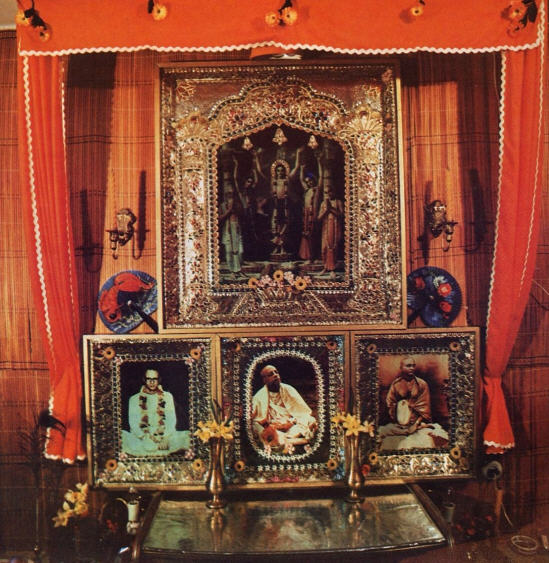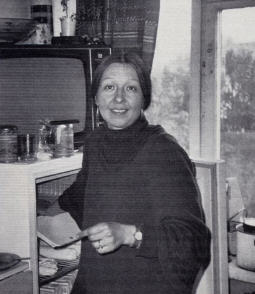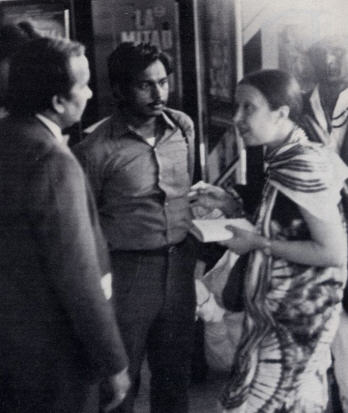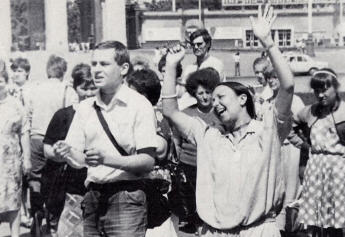The following interview with Premavati-devi dasi, whose eleven-month-old daughter
died in a Soviet labour camp, took place in Moscow in August, 1987

Interviewer: Please tell us something about the practice of Krsna consciousness in the Soviet Union.
Premavati-devi dasi: I have been a member of ISKCON in the Soviet Union for around ten years. It is very difficult to talk about the entire period while I was chanting the Hare Krsna maha-mantra, the period when all the troubles were happening. Now we are at the beginning of a new period, when the new policy [glasnost] is becoming visible here. I am thinking that now we are meeting the new age of Hare Krsna. Having the new bright period, now it is a little bit difficult to talk about the previous dark period.
Of course, the history must be known, and people must know the truth about everything and especially about the people who were accused for nothing else except for chanting the Hare Krsna maha-mantra. Even now I think that the main thing against me was that I spoke with Hare Krsna people in the West. No one ever accused me of anything else. I was the mother of two little children during that period, and I was chanting and reading and translating. I was very busy with my family and was not preaching so openly and widely.
Now we can preach openly on the streets; we sing on Arbat street, in the center of Moscow. We preach and sing and distribute prasadam in our houses, and now we see that Krsna shows us that everything is temporary. For instance, the hard period is over. Of course, there are some people who think in another way, that this Gorbachev period is not the thing to believe in. Maybe I am a little bit gullible, but I believe in Krsna and that He wants this time to be good for everybody. I feel that this nice period will last and develop.
Interviewer: Can you tell us something about your personal difficulties?
Premavati: I was arrested in the end of August, 1983. It was very troublesome for me. I was three-months pregnant, and I gave the court a certificate stating that it was so. I was taken to a hospital in Estonia to be sure that I was pregnant. The doctors said that I was pregnant, and I went home, but in two weeks the authorities came with a paper that stated that I was arrested. They did not care about the certificates saying I was pregnant. I thought that pregnant women would not be put into the prison, but I was wrong.
When I was put into the prison, for the first nine days I was in a common cell with around sixty persons who had committed different kinds of crime, like not having a stamp on their passport indicating that they are assigned to live in some special place. It is considered to be breaking the law. Another very strange law is that if one does not work for two months, one can be put into prison. Many persons were there for breaking these laws not working and not having proper stamps on passports. Of course, there were also murderers and thieves. During those nine days in that cell, I was chanting, singing, and even dancing, and I did not feel so very bad.
After that I was put into another cell where ten women were. It is difficult to say we were sitting in the prison, because we were lying down all the time. There was no place to sit or to go, only to lie down. There was very bad air there. Our place to lie down was about eighty-five centimetres wide, made of iron, with an imitation pillow, iron pillow. Of course, the mat that covered the iron bed was very thin, and sometimes I felt that I was right on the iron strips. While sleeping, if I turned, I would be breathing into the face of my neighbour.
Once a day we had our time to walk in the air, but the sky was covered with a cage. We could only see the sun through the cage, and the bars of the cage were very thick. It was difficult, and I exposed my belly to the sun to try to give some energy to my future child.

Pramavati Devi Dasi
I received some parcels and money from my relatives, but sometimes I did not get them because the control is very strict in the prison. If your parents or relatives make any mistake with the parcel or money, if they do not write down your proper date of birth or something if something is wrong then you cannot receive the money that they send. For instance, my husband isn't Russian, and all the time he made mistakes and I could not receive money at all.
Of course, everyone can understand how nervous pregnant imprisoned women can be. They should not be imprisoned at all. For all of them it was very strange. They were very nervous and not polite to one another. It was even worse than in the cell with sixty people in it.
I think that this period in prison was the most difficult, and I understand that it was so because I was pregnant and with very nervous people. All the time the women were calling to ghosts, talking with Napoleon, Pushkin, asking them about their future. They scolded one another, sometimes slapped one another. All the time they wanted to eat, because they had no parcels. Some could not receive parcels.
Sometimes we had to give people our food. There was very little food, and we were hungry all the time. We received extra eggs and extra meat and pickle, but I was not eating meat or eggs, so I was very hungry.
Then I was transported to another prison. The first prison was called Butyrskaya prison, and the other prison was a special prison for men and pregnant women. If one was to have a child in two months, she was sent there, Matrossklaya prison. At this prison the interrogators asked me when I was to have my child, and I told them, so they scheduled the court trial for just before I was to have my child. Four days after the court ended, my daughter was born.
This court was very strange for me. I felt as if I were sitting at the theatre. Somebody was playing something on the stage, and I was also a member of this play, and I could not realize it as reality. Of course, everything in this world is maya, illusion, but this court really seemed like an illusion to me. I felt it was an illusion in this great illusion of maya.
My sister came to my trial. My mother had died during the third month of my imprisonment. My sister who lives in Nigeria was called, and she received permission to come to the Soviet Union immediately. So she had an opportunity to come to the court. She was crying all the time she was sitting there, because during the court I was nine months pregnant. I could not sit for a long time. I wanted to stand or change my position. It was difficult to be there for the whole day in the courtroom, from ten in the morning to seven in the evening.
I was hungry in this new prison, and all the time I had to behave myself not the way I wanted to behave myself. Even the character analysis they gave about me during my ten months in the prison they called me a silent person, not making contacts with people. But I consider myself just the opposite. I like to meet people, maybe speaking more than is needed. I like people. I like to speak about God, about how to come to God. I am not silent. At that time I had to make another character. I had to do it because the situation was like that.
Once I wrote a letter to another cell. That was a regular practice, because prisoners would ask each other questions. I answered the questions about my crimes, and then told them about the Hare Krsna movement. That letter somehow appeared not in the other cell but in the hands of the interrogator. After that I understood that I must be very, very silent. During the court they said that while I was in prison I was preaching. Now I understand that if I go to prison again, I will be preaching one hundred percent of the time, not just trying to be silent. I think now that it was my mistake, because they said that I was preaching when in fact I wasn't. Now I think that I could do more if I am put into prison again.
Interviewer: Could you tell us about the time you spent in the labour camp?
Premavati: When my daughter was four months old, we went to a labour camp. She was very little, and it was not good to have to move her somewhere. We went there, and after the twenty-one-day period when the child can be with its mother, I was taken away from her, and I began to work. I saw my daughter once a day for about an hour. I could have a walk with her or sit in the house, but not more than an hour. It was very little time, and after awhile I began to see that my daughter did not feel like I was her mother. It caused me to feel bad, but I could not do anything about it.
The place where my daughter was is called the House of Mother and Child. In this house there were about one hundred children whose mothers were working in the camp.

The food for the children was not bad, but there was only one nurse who had to feed about twenty-four little eaters. The nurse moved with great speed, so sometimes the babies could not eat much. I cannot understand how they did it, because I remember when I was feeding my daughters, I spent very much time. How could they feed all those little babies in an hour and ten minutes?
The most unbearable thing was that the air in this room was very bad. The mothers could not stand it, but the babies lived there all the time. Of course, the nurses tried to make ventilation by opening the windows, but that didn't help; the air was unbearable. We could not do anything.
My daughter was very nice, of nice appearance, and even in prison the nurses said that she was one of the prettiest girls. I knit her a hat, boots, and a jersey from the thread of handkerchiefs. But when we came to the camp, the authorities said it was not permitted to have jersey and boots only hat; everything else will be given by the authorities. Of course, they gave everything, but those things were not warm, and she had no warm jersey at all.
She died because she had a lung disease. Even now I do not know exactly what happened. Many times I asked what happened, and they told me, "Afterwards, afterwards, afterwards." They did not want to tell me. Everything was all right, but she was coughing. Then there was a stomach disease in every group of babies. She also had this stomach disease along with coughing. Then the doctors said it was her lungs, pneumonia, and her heart would not work. They wanted to take her to the hospital from the nursery. When they took her, on the way to the hospital she died. They said that the last day of her life she said "Mother" for the first time. I was not there.
They made a little coffin for her. They allowed me to be before the coffin for ten minutes, and after that they did not let me stay there. The funeral was held without me. When I stood with her body, I said "Hare Krsna" and prayed to Krsna to take care of her.
Of course, it is strange that such things happen in such a great country as the Soviet Union. I think that such things as imprisoning pregnant women should not be done, not here or any place in the world, because children must have their mothers. This present period is the nicest period during my life. Everything is now so nice, but not for those babies still in prison. So I would like to appeal to all people to ask our authorities to stop imprisoning people who believe in God, who chant the Hare Krsna maha-mantra, which purifies themselves and the aura of the entire planet. It will be very helpful for those who are sitting in prison now.
Working in the labour camps is very hard, especially for people who are not accustomed to physical work. For intelligent people it is very difficult to be in the labour camp. There are many Hare Krsna devotees who have very serious diseases, such as Vladimir Kustrya [Vrndavana dasa], who has a lung disease and who also has no energy to work low blood pressure. When I was in Moscow, I also had to work, and my blood pressure was very low. Once it was eighty over eighty-five. I was very exhausted during the period of working in the labour camp.
The most unbearable thing was that you could never be alone in prison. The Russian writer Dostoyevsky also wrote about this fact, that the most difficult thing is not being able to be alone. You can't even be five minutes alone. All the time you must be with people.
There are many strict rules which say that one must do this and not that, eat this and not that. From another point of view the austerity for one who is trying to be a yogi is really very nice. You understand that you can eat less, that you can wear less, you can sleep less, that the human being's energy and power is very great, much more than a person can imagine.
During this labour camp period it was difficult to chant the Hare Krsna maha-mantra because there was no time, no time at all. In that camp we worked very many hours. We worked ten hours, and after that I would visit the school for sewing, and then I had to do some work for the group I was with. I made some lectures about nice behaviour and similar themes. People who had higher education were asked to speak in order to bring less-educated people to a higher standard. So I was very busy and had no time to rest at all.

Now the time is turning for the better, as I mentioned earlier. We have kirtanas in the center of Moscow, on the Arbat street, where very many people gather to sing or speak about something or do whatever they like. Painters make pictures of people. Poets are there. Hare Krsna people are also there. We are part of this Arbat movement. We sing Hare Krsna, and we answer questions.
Yesterday we saw the KGB people come to our chanting place. First they listened to our kirtanas, and then they mingled with the crowd. There were many people listening to us preach about Krsna consciousness. The KGB began to preach just the opposite: "Why are you listening to these religious speeches? Nowadays we must not believe in God." Sometimes they argued with us. I told them that I was not going to argue with them at all. My feeling is that arguments are only a waste of time. I am only telling the views of the Bhagavad-gita and the Srimad-Bhagavatam. It is Vedic knowledge, and it is not my opinion. It was a real battle between us.
Another person I had seen with the KGB came up and said, "I am a weightlifter. For fifteen years I have lifted weights. How can I be a vegetarian?" I said, "No, it is not true. You are not a weightlifter. You are with the KGB! I am sure. I know it!" Nevertheless, they were not very aggressive. It is democracy, so we are preaching and they are preaching. Yesterday it was vivid that we have the same rights to preach as they have.
It is very nice that here in Moscow we have such an opportunity, but some very sad news came from Kiev. In Kiev several devotees went on the street to have kirtana and were imprisoned for fifteen days. One mother of two little boys, whose husband was imprisoned, came to Moscow yesterday. She demonstrated, protesting to let her husband free. After that he was released, but the other people were not. They are imprisoned for what we have been doing in Moscow now for over a month. We are singing kirtanas every day, but in Kiev democracy is not so real.
Yesterday, someone returned from the beach of the Black Sea, from one little town called Kerch. He said that he was at the houses of three devotees and that they had nice altars. He said that about a week ago those houses with the altars were burned down by the militia men while the devotees were working or away. This is very bad news, militia men fighting against the Vaisnavas without any court or trial.
Now we can see that very many people are coming to be Vaisnavas, and it is very nice. We understand that these people chant and sing Hare Krsna. Anybody who does it, even a little bit, can purify himself, and it will be so nice if everybody will simply try to do it. Then if you understand the essence of the maha-mantra, if you understand that Krsna Himself comes in those sounds, you will understand God Himself, and you will feel God and you will have an opportunity to see God, really, with your own eyes. And it will be so nice for everybody, because I think everybody is eager to see God. You have an opportunity. Please chant Hare Krsna.
